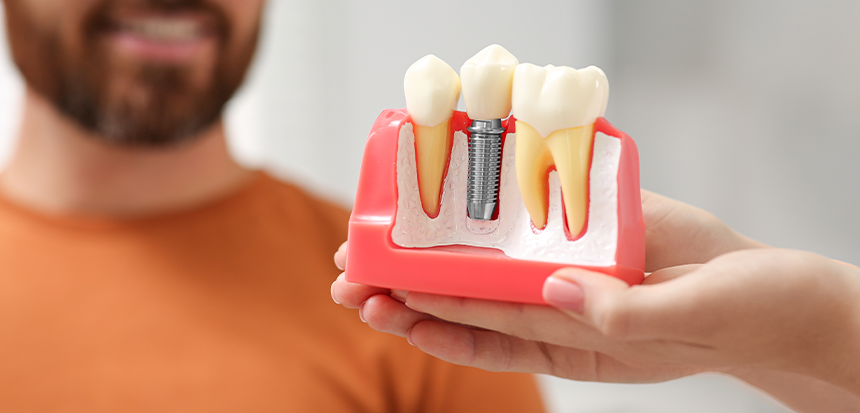
This method provides an aesthetic and functional solution for lost teeth, making dental implants one of the most popular and effective treatments for tooth loss today.
A dental implant is a screw-like structure made from biocompatible materials such as titanium, which is placed in the jawbone. These implants serve as a foundation for replacing missing teeth and are completed with prosthetic teeth placed on top. The primary purpose of dental implants is to address the aesthetic and functional problems caused by missing teeth. This way, patients can achieve a more beautiful smile and regain their chewing functions.
Dental implants can be applied for a range of cases, from single tooth loss to complete edentulism. Implants ensure that prosthetic teeth are securely attached to the jawbone, allowing patients to speak, smile, and eat comfortably. Additionally, implants prevent jawbone loss and help maintain facial structure.
Dental implants are categorized into different types based on their use and structure. The most common type is the root-form implant, which resembles natural tooth roots and is placed directly into the jawbone. There are also alternative implant types developed for specific conditions, such as mini implants and zygomatic implants.
Mini implants are ideal for patients with narrow jawbones and are often used to stabilize temporary prostheses. Zygomatic implants are long implants placed in the cheekbones for patients with insufficient upper jawbone strength. These implants are particularly preferred to provide stability for upper jaw prostheses.
The dental implant procedure typically involves several stages. First, a detailed oral and jaw X-ray is taken to evaluate the patient’s bone structure. Next, local anesthesia is applied to the area where the implant will be placed, and the screw-like implant is inserted into the jawbone. A healing period, usually between 3 to 6 months, is necessary for the implant to fuse with the jawbone.
After the healing process is complete, an abutment is placed on top of the implant. In the final stage, the prosthetic tooth is mounted on the abutment. This prosthetic tooth is specially crafted to match the patient’s natural teeth. Post-implant treatment, it is crucial for patients to attend regular dental check-ups and maintain oral hygiene.
One of the biggest advantages of dental implants is that they offer aesthetic and functional results closest to natural teeth. Implants securely anchor prosthetic teeth to the jawbone, allowing patients to speak, smile, and eat with ease. Moreover, implants prevent jawbone loss and help preserve facial features.
Dental implants offer long-lasting and durable solutions. With proper care and regular dental check-ups, implants can last a lifetime. Therefore, dental implants are a reliable and permanent option for treating missing teeth. For detailed information about dental implant prices and procedures, you can contact EMPCLINICS.
Dental implants are fixed to the jawbone like natural tooth roots and are topped with prosthetic teeth. They closely resemble natural teeth in appearance and functionality.
Dental implants can be done in adults and young individuals who have completed their bone development. However, bone density and overall health should be evaluated in elderly patients.
Titanium implants rarely cause allergic reactions because they are biocompatible. However, alternative materials such as zirconium can be used for patients with a titanium allergy.